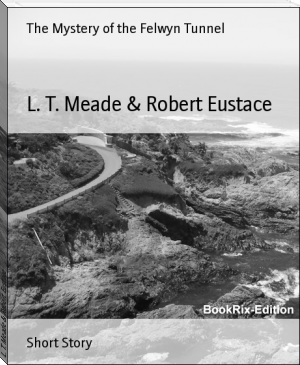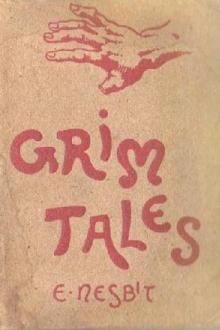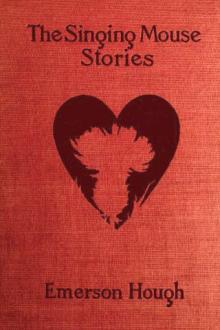L. T. Meade & Robert Eustace, The Mystery of the Felwyn Tunnel [best books to read ever txt] 📗

- Author: The Mystery of the Felwyn Tunnel
Book online «L. T. Meade & Robert Eustace, The Mystery of the Felwyn Tunnel [best books to read ever txt] 📗». Author The Mystery of the Felwyn Tunnel
I was making experiments of some interest at South Kensington, and hoped that I had perfected a small but not unimportant discovery, when, on returning home one evening in late October in the year 1893, I found a visiting card on my table. On it were inscribed the words, "Mr. Geoffrey Bainbridge." This name was quite unknown to me, so I rang the bell and inquired of my servant who the visitor had been. He described him as a gentleman who wished to see me on most urgent business, and said further that Mr. Bainbridge intended to call again later in the evening. It was with both curiosity and vexation that I awaited the return of the stranger. Urgent business with me generally meant a hurried rush to one part of the country or the other. I did not want to leave London just then; and when at half-past nine Mr. Geoffrey Bainbridge was ushered into my room, I received him with a certain coldness which he could not fail to perceive. He was a tall, well-dressed, elderly man. He immediately plunged into the object of his visit.
"I hope you do not consider my unexpected presence an intrusion, Mr. Bell," he said. "But I have heard of you from our mutual friends, the Greys of Uplands. You may remember once doing that family a great service."
"I remember perfectly well," I answered more cordially. "Pray tell me what you want; I shall listen with attention."
"I believe you are the one man in London who can help me," he continued. "I refer to a matter especially relating to your own particular study. I need hardly say that whatever you do will not be unrewarded."
"That is neither here nor there," I said; "but before you go any further, allow me to ask one question. Do you want me to leave London at present?"
He raised his eyebrows in dismay.
"I certainly do," he answered.
"Very well; pray proceed with your story."
He looked at me with anxiety.
"In the first place," he began, "I must tell you that I am chairman of the Lytton Vale Railway Company in Wales, and that it is on an important matter connected with our line that I have come to consult you. When I explain to you the nature of the mystery, you will not wonder, I think, at my soliciting your aid."
"I will give you my closest attention," I answered; and then I added, impelled to say the latter words by a certain expression on his face, "if I can see my way to assisting you I shall be ready to do so."
"Pray accept my cordial thanks," he replied. "I have come up from my place at Felwyn to-day on purpose to consult you. It is in that neighbourhood that the affair has occurred. As it is essential that you should be in possession of the facts of the whole matter, I will go over things just as they happened."
I bent forward and listened attentively.
"This day fortnight," continued Mr. Bainbridge, "our quiet little village was horrified by the news that the signalman on duty at the mouth of the Felwyn Tunnel had been found dead under the most mysterious circumstances. The tunnel is at the end of a long cutting between Llanlys and Felwyn stations. It is about a mile long, and the signal-box is on the Felwyn side. The place is extremely lonely, being six miles from the village across the mountains. The name of the poor fellow who met his death in this mysterious fashion was David Pritchard. I have known him from a boy, and he was quite one of the steadiest and most trustworthy men on the line. On Tuesday evening he went on duty at six o'clock; on Wednesday morning the day-man who had come to relieve him was surprised not to find him in the box. It was just getting daylight, and the 6.30 local was coming down, so he pulled the signals and let her through. Then he went out, and, looking up the line towards the tunnel, saw Pritchard lying beside the line close to the mouth of the tunnel. Roberts, the day-man, ran up to him and found, to his horror, that he was quite dead. At first Roberts naturally supposed that he had been cut down by a train, as there was a wound at the back of the head; but he was not lying on the metals. Roberts ran back to the box and telegraphed through to Felwyn Station. The message was sent on to the village, and at half-past seven o'clock the police inspector came up to my house with the news. He and I, with the local doctor, went off at once to the tunnel. We found the dead man lying beside the metals a few yards away from the mouth of the tunnel, and the doctor immediately gave him a careful examination. There was a depressed fracture at the back of the skull, which must have caused his death; but how he came by it was not so clear. On examining the whole place most carefully, we saw, further, that there were marks on the rocks at the steep side of the embankment as if some one had tried to scramble up them. Why the poor fellow had attempted such a climb, God only knows. In doing so he must have slipped and fallen back on to the line, thus causing the fracture of the skull. In no case could he have gone up more than eight or ten feet, as the banks of the cutting run sheer up, almost perpendicularly, beyond that point for more than a hundred and fifty feet. There are some sharp boulders beside the line, and it was possible that he might have fallen on one of these and so sustained the injury. The affair must have occurred some time between 11.45 p.m. and 6 a.m., as the engine-driver of the express at 11.45 p.m. states that the line was signalled clear, and he also caught sight of Pritchard in his box as he passed."
"This is deeply interesting," I said; "pray proceed."
Bainbridge looked at me earnestly; he then continued:--
"The whole thing is shrouded in mystery. Why should Pritchard have left his box and gone down to the tunnel? Why, having done so, should he have made a wild attempt to scale the side of the cutting, an impossible feat at any time? Had danger threatened, the ordinary course of things would have been to run up the line towards the signal-box. These points are quite unexplained. Another curious fact is that death appears to have taken place just before the day-man came on duty, as the light at the mouth of the tunnel had been put out, and it was one of the night signalman's duties to do this as soon as daylight appeared; it is possible, therefore, that Pritchard went down to the tunnel for that purpose. Against this theory, however, and an objection that seems to nullify it, is the evidence of Dr. Williams, who states that when he examined the body his opinion was that death had taken place some hours before. An inquest was held on the following day, but before it took place there was a new and most important development. I now come to what I consider the crucial point in the whole story.
"For a long time there had been a feud between Pritchard and another man of the name of Wynne, a platelayer on the line. The object of their quarrel was the blacksmith's daughter in the neighbouring village--a remarkably pretty girl and an arrant flirt. Both men were madly in love with her, and she played them off one against the other. The night but one before his death Pritchard and Wynne had met at the village inn, had quarrelled in the bar--Lucy, of course, being the subject of their difference. Wynne was heard to say (he was a man of powerful build and subject to fits of ungovernable rage) that he would have Pritchard's life. Pritchard swore a great oath that he would get Lucy on the following day to promise to marry him. This oath, it appears, he kept, and on his way to the signal-box on Tuesday evening met Wynne, and triumphantly told him that Lucy had promised to be his wife. The men had a hand-to-hand fight on the spot, several people from the village being witnesses of it. They were separated with difficulty, each vowing vengeance on the other. Pritchard went off to his duty at the signal-box and Wynne returned to the village to drown his sorrows at the public-house.
"Very late that same night Wynne was seen by a villager going in the direction of the tunnel. The man stopped him and questioned him. He explained that he had left some of his tools on the line, and was on his way to fetch them. The villager noticed that he looked queer and excited, but not wishing to pick a quarrel thought it best not to question him further. It has been proved that Wynne never returned home that night, but came back at an early hour on the following morning, looking dazed and stupid. He was arrested on suspicion, and at the inquest the verdict was against him."
"Has he given any explanation of his own movements?" I asked.
"Yes; but nothing that can clear him. As a matter of fact, his tools were nowhere to be seen on the line, nor did he bring them home with him. His own story is that being considerably the worse for drink, he had fallen down in one of the fields and slept there till morning."
"Things look black against him," I said.
"They do; but listen, I have something more to add. Here comes a very queer feature in the affair. Lucy Ray, the girl who had caused the feud between Pritchard and Wynne, after hearing the news of Pritchard's death, completely lost her head, and ran frantically about the village declaring that Wynne was the man she really loved, and that she had only accepted Pritchard in a fit of rage with Wynne for not himself bringing matters to the point. The case looks very bad against Wynne, and yesterday the magistrate committed him for trial at the coming assizes. The unhappy Lucy Ray and the young man's parents are in a state bordering on distraction."
"What is your own opinion with regard to Wynne's guilt?" I asked.
"Before God, Mr. Bell, I believe the poor fellow is innocent, but the evidence against him is very strong. One of the favourite theories is that he went down to the tunnel and extinguished the light, knowing that this would bring Pritchard out of his box to see what was the matter, and that he then attacked him, striking the blow which fractured the skull."
"Has any weapon been found about, with which he could have given such a blow?"
"No; nor has anything of the kind been discovered on Wynne's person; that fact is decidedly in his favour."
"But what about the marks on the rocks?" I asked.
"It is possible that Wynne may have made them in order to divert suspicion by making people think that Pritchard must have fallen, and so killed himself. The holders of this theory base their belief on the absolute want of cause for Pritchard's trying to scale the rock. The whole thing is the most absolute enigma. Some of the country folk have





Comments (0)